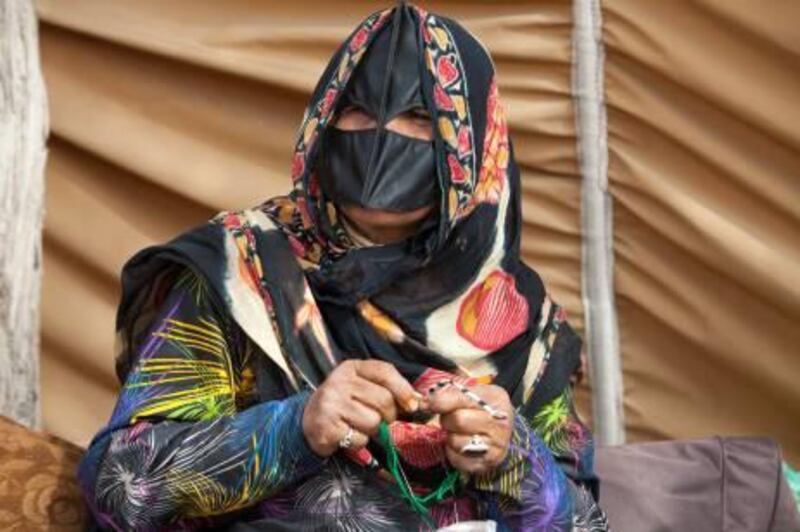RAS AL KHAIMAH // Umm Moukheet prefers a tent to a house and the seat of her 4x4 to a couch. That’s just as well, because she is almost always on the move.
She is one of the women who follow the camel racing circuit around the Gulf in the winter, selling food, perfume and camel tack to those racing and watching.
“Old women don’t like to sit in the house,” said Umm Moukheet, a mother in her 50s from Dubai. “If I sit in the house I’ll be very bored. This life is very healthy and if you sleep in the house you’ll be sick.”
She has followed the circuit for 30 years and relocates her hibiscus-patterned tent each time the race moves to a new festival in a new city. The schedule takes her and her colleagues from RAK through Abu Dhabi, Dubai, Ajman and Umm al Qaiwain. They will be at Abu Dhabi’s al Wathbah track this week before heading to Qatar for the end of the season.
Umm Moukheet began camping at the makeshift souq beside the track after her husband’s death. She works with three Bangladeshi men who serve coffee, tea, dumplings and bread to customers and friends. Her trackside job, which helps keep her busy in her retirement, is in fact a return to her Bedouin youth when she joined races at weddings with her parents.
While her daughters prefer riding horses to camels, Umm Moukheet thinks there is no happier life than one that follows the humped beast of the desert.
“I like this travel,” she said. “I got my licence two years ago but I’ve been driving for 28 years. We are Bedu so we started this life from when we were young. When you see camels, we come.”
While Umm Moukheet travels the camel circuit for fun, for many of her colleagues the business is their family’s main income. Most come from the south-east coast of Oman to sell colourful camel tack, much of which has a high bling factor. Their husbands survive as fishermen.
The Omani women are a contrast to the dusty beige of their surroundings, doing business in loose gowns in vibrant shades of amber, crimson, lilac and sapphire blue. Under their shining burqas their faces are painted with heavy white make-up and their eyes are lined with kohl. Older women have dotted tattoos on their chins and arms.
The women travel with their children, sleeping in musky tents and bundling up under blankets to protect themselves from the cold desert nights.
“This is our business, this is the life for my sons,” said Ghariba Mohammed, 45, a mother of nine. “We want money, we want to eat and live.”
Her four daughters continue the work that she learnt when she was 20. She travels with her grown sons, nephews, their wives and a pack of grandchildren.
The wares on offer are as colourful as the women selling them. They use ghaf tree bark to stain grey and white yarn into brilliant reds and deep oranges. Saffron and a plant called wars give hues of yellow and orange, and threads from India and China give the handicrafts an extra pop of navy blue, hot pink and fuchsia.
The labour can be intensive. It takes about 150 hours to make an 80x30cm blanket. A five-square-metre blanket, which takes several weeks to make, sells for Dh1,000.
Key chains, tablecloths and decorative household goods have replaced camel paraphernalia as the most popular items. Only a handful of the hundreds who attend the races make their way to the tented souq to seek more expensive items. The day’s take is sometimes just Dh100, Mrs Mohammed said.
While the life can be hard, government support and the patronage of sheikhs ensure the tradition continues to attract newcomers.
Sheikh Hamdan bin Mohammed, the Crown Prince of Dubai, is known to be generous to those near the track when his camels win. RAK Municipality provides women with water and fruit when they visit the emirate and the Marmun track in Dubai has its own tents for the women, with police security to watch over them.
One newcomer is Muna al Shamsi, 30, a perfume merchant of 10 years who lives on government support in Fujairah. She steers her wheelchair through the dust of the camel track’s paths, shouting greetings and bidding people to stop at her tent for perfume. She is accompanied by Samira Muligita, an Ethiopian who helps her prepare cardamom tea that is served on a fake gold tray.
“All people know me, they like me, they ask for me,” said Ms al Shamsi. “I love Ras al Khaimah and for sure I will return.”
azacharias@thenational.ae






